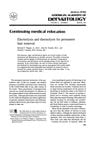Biomedical Versus Cultural Constructions of Abnormality: The Case of Idiopathic Hirsutism in the United States
June 1988
in “
Culture, medicine and psychiatry
”

TLDR The perception of excessive hair growth in women as abnormal is more influenced by cultural norms than by medical reasons.
The document from 1988 examines idiopathic hirsutism from both biomedical and cultural viewpoints, emphasizing the condition's psychological and social impact on women due to societal gender norms. It suggests that while hirsutism can indicate endocrine issues, it is often not medically concerning. The paper discusses the historical stigmatization of female body hair, the role of depilatory industry advertisements in reinforcing gender norms, and the cultural significance of maintaining clear gender distinctions. It also explores the resistance to change in core gender identity and the pressures women face to conform to idealized standards of femininity through hair removal. The document concludes that the perception of hair growth as abnormal is more a result of cultural constructs than medical categorization, with societal expectations heavily influencing the treatment and understanding of idiopathic hirsutism.





